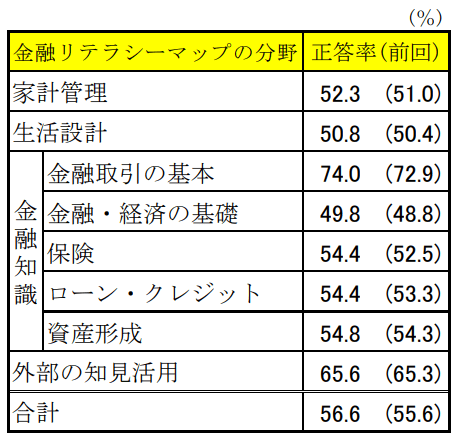管理人オススメコンテンツはこちら
「日本人の金融リテラシーは本当に低い|25,000人のデータが示す“金融弱者”の現実」
今日は【総論】
25,000人に調査
こんなにヤバイ日本人の金融知識レベル
というお話しをします。
●気づいた人からお金持ちになる〜情報格差は資産格差〜
知り合いが相談を受けたそうです。
「日本人は
アメリカやヨーロッパの人と比較して
圧倒的に金融知識のレベルが低いと
言われています。
こうやって不安を煽って
誰かが何かの商売に
活かそうとしている
だけなのではないかと
思ってしまいます。
しかし私自身に関して言えば
そこまで知識レベルが低いとは
思いませんし
まわりを見渡しても
それなりに家計管理や投資を
上手にやってるように見えます。
日本人の金融リテラシーが低い
というのは本当なのでしょうか?」
とのこと。
残念ながら
日本人の金融リテラシーは
本当に低いんですね。
金融リテラシーというのは
お金に関する
・知識
・判断力
の事です。
政府は日本人の金融知識の
レベルをチェックするために
2016年に初めて
『金融リテラシー調査』という
大規模な調査を行いました。
この結果を
・アメリカ
・イギリス
・ドイツ
などで行われた
調査結果と比較した結果
日本人の金融リテラシーが
圧倒的に低いという事が
判明したんですね。
個人的には
習ってないから仕方ないのであって
伸び代がたっぷり有ると感じています。
今日のお話しでは
2019年に行われた(その後2022年にも実施)
金融リテラシー調査の内容を紹介して
いかに
日本人の金融リテラシーが低いかという
その実態をお話ししていきたいと思います。
金融リテラシーを
高めるためのヒントも
散りばめながらお話ししていくので
「今よりもお金持ちになりたい!」
という人は
是非最後までお付き合いください。
●こんなにヤバい!日本人の金融リテラシー
まず2019年に行われた
金融リテラシー調査の概要を
お話しします。
◎目的
18歳以上の個人の金融リテラシー
・お金の知識
・判断力
を把握する事
◎対象者
18〜79歳の25,000人
◎調査方法
インターネットによるアンケート調査
◎問題数
8分野にわたる全58項目
◎各分野ごとの正答率

(金融広報中央委員会「「金融リテラシー調査 2019年」の結果 」より抜粋)
正答率が50%強の問題が
沢山有ったという事なんですよ。
では
実際どんな問題が有ったのかというのを
一緒に見ていきたいと思います。
実際どんな問題が出されたのか?
その中から5問題だけ紹介するので
一緒に答えを考えながら
読み進めて頂きたいと思います。
〜〜〜つづく〜〜〜
Special Thanks college president Ryo.
●おまけ
≪≪perplexityちゃんによる文章まとめ≫≫
2019年に実施された金融リテラシー調査によると、日本人の金融知識や判断力はアメリカやヨーロッパ諸国と比べて著しく低いことが明らかになりました。
調査は18~79歳の25,000人を対象に、インターネットで行われ、8分野58問の設問に対する正答率は平均で50%強と低水準でした。
特に若年層の正答率が低く、金融教育の機会が少ないことが一因と考えられます。
日本ではお金について学ぶ機会が限られているため、今後は金融リテラシー教育の充実が求められています。
金融知識を身につけることで、情報格差が資産格差につながる現代社会において、より豊かな生活を実現することができるでしょう。
[1] https://www.shiruporuto.jp/public/document/container/literacy_chosa/2019/
[2] https://www.linkard-group.com/column/947/
[3] https://www.1kinsenkyouiku.com/column-view/japanese_money_education/
[4] https://money-bu-jpx.com/news/article033865/
[5] https://www.nomura.co.jp/el_borde/real80s/0052/
[6] https://www.shiruporuto.jp/public/document/container/literacy_chosa/
≪≪Chat-GPTくんによる英訳≫≫
Today’s Topic: General Overview
Survey of 25,000 People
How Shockingly Low Is Japanese Financial Literacy?
That’s the topic for today.
—
【Those Who Realize It First Become Wealthy– Information Gap Is Asset Gap –】
A friend of mine recently received a question:
> “I often hear that Japanese people have significantly lower financial literacy compared to people in the U.S. or Europe.
> But sometimes I feel like this is just a fear-mongering tactic to sell something.
>
> Personally, I don’t think my financial knowledge is particularly low.
> Looking around, people seem to manage their household finances and investments fairly well.
>
> Is it really true that Japanese people have such low financial literacy?”
Unfortunately, yes.
Japanese financial literacy is, in fact, quite low.
—
What Is Financial Literacy?
It refers to:
Knowledge about money
The ability to make sound financial decisions
In 2016, the Japanese government conducted a large-scale Financial Literacy Survey for the first time to assess the financial knowledge of its citizens.
The results were compared with similar surveys conducted in:
The United States
The United Kingdom
Germany
And the results clearly showed that Japanese financial literacy is significantly lower than in those countries.
—
A Matter of Education – But There’s Room to Grow
Personally, I think it’s simply because we were never taught these things.
In that sense, there’s **great potential for improvement**.
In today’s talk, I’d like to:
Introduce the 2019 Financial Literacy Survey
Show how low Japanese financial literacy really is
Share tips on how to improve it
If you’re someone who wants to **become wealthier**, I encourage you to stick with me to the end.
—
【How Bad Is It? Japanese Financial Literacy in 2019】
Let’s start with an overview of the 2019 survey:
◎ Purpose:
To measure the financial literacy (knowledge and decision-making ability) of individuals aged 18 and over.
◎ Target Group:
25,000 individuals aged 18 to 79
◎ Method:
Online questionnaire
◎ Content:
58 questions covering 8 categories
◎ Results:
(From the “2019 Financial Literacy Survey” by the Central Council for Financial Services Information)
Many questions had correct answer rates just above 50%, indicating widespread misunderstanding or lack of knowledge.
—
Next, I’ll share five sample questions from the survey.
Let’s go through them together and think about the answers as we go.
Special Thanks OpenAI and Perplexity AI, Inc








